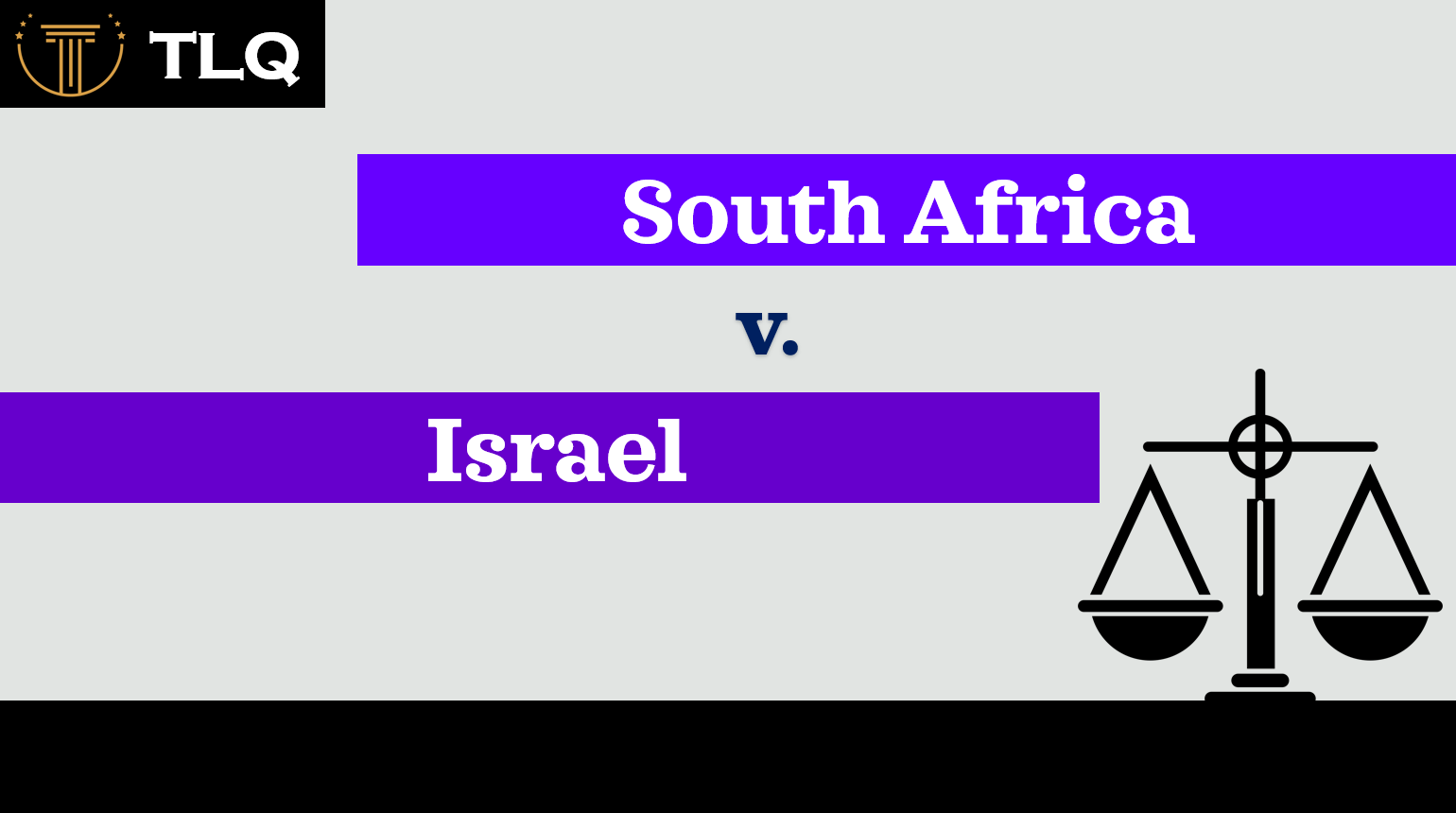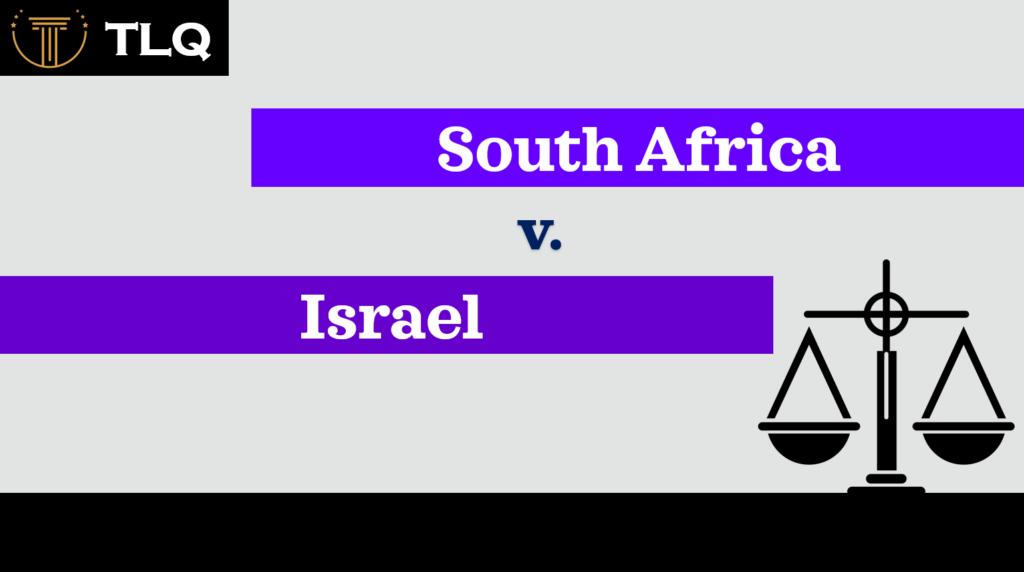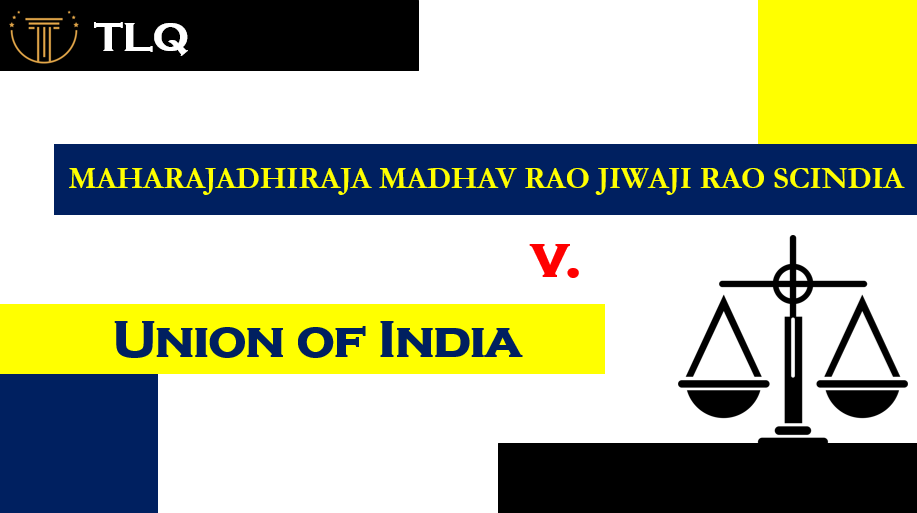Published On: 20th June, 2024

Authored By: Anshula Shreshth
THE ICFAI UNIVERSITY, HYDERABAD
Facts
Israel has been waging a massive military offensive, by land, air, and sea, on the highly urbanized Gaza Strip (or “Gaza”) since October 7, 2023. The Gaza Strip is a tiny strip of territory that is around 365 square kilometres in size. Gaza is residence to some 2.3 million residents, about half of whom are children. Israel has launched what has been called one of the “largest regular missile operations” in the annals of current warfare against the region. It was predicted that 6,000 bombs have been thrown on the little enclave every week as of October 29, 2023, alone. Israel claimed that in less than two months, its military assaults had “wreaked greater damage than the razing of Syria’s Syrian capital between 2012 and 2016,” the Allied bombardment of Germany during World War II, or Ukraine’s Mariupol. Gaza has suffered so much damage from Israel that it now has a distinct colour from space. Its texture is distinct. The UN Secretary-General of the UN General Assembly took explicit “note” of Change ESIO/22 of December 12, 2023, on the safeguarding of People and maintaining Legal and Emergency Obligations, which was mentioned in a letter dated December 6, 2023, to the head of the UN Security Council.
“Gaza’s civilian population is at dire risk. It is claimed that over 15,000 people have died since Israel began its military action, with over 40% of those murdered being minors. Numerous thousands more have suffered injuries. Over 50% of all dwellings have been demolished. Approximately 80% of the 2.2 million people living there have been forcibly relocated, progressively living in smaller regions. In Gaza, UNRWA facilities are home to nearly 1.1 million refugees, resulting in cramped, unclean, and undignified circumstances. Some find themselves homeless because they have nowhere to stay. There are explosive war relics making places uninhabitable. Civilians are not well protected.
Gaza’s health care system is crumbling. Hospitals are becoming battlefields. Out of 36 institutions, only 14 hospitals are even partially operational. In addition to running at a third of the usual bed capacity, the two main healthcare facilities in southeast Gaza are running low on fuel and essential supplies. Additionally, thousands of displaced people are being housed by them. There will be more untreated deaths in the upcoming days and weeks as a result of these conditions.
Nowhere is safe in Gaza.
The situation is so dire that I anticipate public order will soon collapse under the continuous barrage from the Israel Défense Forces, without shelter or basic necessities for survival. This will make it hard to provide even minimal humanitarian aid. Epidemic illnesses and more pressure for mass migration into neighbouring nations might make the situation much worse.
Although supplies are still being sent via Rafah, the amount has decreased since the pause ended and is currently inadequate. We really can’t go to those in Gaza who are in need. There is a serious chance that the humanitarian system may fail. The situation is rapidly spiralling out of control, perhaps resulting in permanent consequences for the Palestinian people as a whole, as well as for regional peace and security. At all costs, we must prevent such a result.
The figures have gotten much more alarming since that letter was written: over 55,243 Palestinians have been injured, many of them seriously, and at least 21,110 Palestinians have died in Gaza. Without ignoring the 4,700 women and children who are still unaccounted for and thought to be buried beneath the debris, the death toll includes around 7,729 youngsters. Houses spanning several generations have all been totally destroyed. More than 355,000 dwellings, or more than sixty per cent of Gaza’s total housing stock, have been damaged or completely destroyed. Around 85 per cent of the Palestinian population, or 1.9 million people, are internally displaced. Many people left the territory’s north for the south after receiving orders from Israel to do so. However, after being bombarded in the south, they were urged to leave again, this time towards the southwest or farther south, where they were forced to live in camps with improvised tents and no access to water, sanitary facilities, or other amenities. Israel has bombarded, shelled, and surrounded Gaza’s hospitals, causing just 13 of the 36 hospitals to be partially operational and leaving North Gaza without a single fully operational hospital. There are tales of surgeries, like as amputations and caesarean sections, being performed without anaesthesia, indicating that Gaza’s healthcare system has all but failed. A sizeable fraction of the injured and ill cannot get any care at all, let alone sufficient treatment. Experts warn of the potential of meningitis, cholera, and other epidemics among the Palestinian population that has been displaced due to infectious and epidemic illnesses. The whole population of Gaza faces an impending famine, while the Integrated Food Security Phase Classification (or “IPC”) indicates that the percentage of families experiencing acute food insecurity is the highest it has ever been. Experts caution that deaths from hunger and dehydration that are quiet and gradual might eventually outnumber those that are dramatic and brought on by Israeli bombs and missiles.
With the UN Security Council highlighting in particular “the disproportionate effect on children,” the UN General Assembly has voiced “grave concern regarding the deplorable social situation in the Gaza Strip and the hardships of the Palestinian civilian population.” The Assembly of the United Nations also expressly “noted” a letter dated December 7, 2023, written to the President of the General Assembly by the Commissioner-General of the United Nations Assistance as well as Performs Agency for Palestine Refugees in the Middle East (UNRWA), which was included in Resolution ES10/22 of December 12, 2023. The Commissioner-General demands “an end to the decimation of Gaza and of its people” and “predicts a breakdown of the responsibility he is expected to fulfil” in the historic letter.
Background
Unquestionably, Gaza is currently experiencing a severe and tragic humanitarian catastrophe. By the end of 2023, the number of dead in Gaza had surpassed 20,000, including fighters and civilians, and over 52,000 people had been wounded. Women and children have made up the bulk of those dead and wounded. Within Gaza, about 80% of the population has been internally displaced. A large portion of the populace is currently threatened by hunger and illness in addition to the continuous possibility of military action.
On October 7 and 8, Israel’s strong right-leaning government utterly failed to defend its populace from an attack. Sexually brutality targeting female troops and hostages, as well as the sexual abuse and killing of Israeli and international civilians, were among the crimes carried out by Hamas activists and other terrorists. Out of the 172 persons who are still missing, 25 are believed to be dead, while the remaining individuals continue to be detained in Gaza, most likely in passageways beneath the city.
Although many Palestinian activists abroad rely, they adhere to the tagline as a call for reconciliation and equality, Hamas firmly opposes the idea of a two-state solution. For years, many Jews have interpreted Hamas’ use of the phrase “from the water’s edge to the sea” to mean the fall of the State of Israel and the extermination of the over 7 million Jews who live in the region between the Jordan River and the Mediterranean Sea. In the meantime, the idea of a self-governing and autonomous Palestinian state has been purposefully obstructed by the Israeli government, led by its leader, Benjamin Netanyahu. Notwithstanding the fact that twenty per cent of Israeli citizens are Arab, conservative groups radicals in Israel illegally seek to drive out Palestinians from the West Bank and Gaza and oppose non-Jewish immigration (primarily Muslim, but also Christian and Druze). Simultaneous alienation has been exacerbated by the prolonged disputes, which have also severely constrained room for peace.
Major Issues
In the hypothetical case of South Africa v. Israel before the International Court of Justice (ICJ), certain major issues would likely be at the core of the claims made by both sides. These problems will primarily revolve around the legality of Israel’s conduct in the controlled Palestinian lands and the observance of relevant constitutional principles. These are some significant subjects that could potentially be discussed:
- Occupation and Annexation: One of the primary reasons for debate will be how the Israeli control of the West Bank and Gaza Strip, which is illegal under the law of nations, counts as acquisition. The Republic of South Africa would likely contend that Israel’s activities are equal to de facto annexed territories while Israel might likely counter that its existence in these territories is due to the need for defence and is not equal to annexation.
- Settlements: The validity of Israeli colonies in the areas under occupation represents one of the primary issues. The contention from South Africa is likely that the establishment and expansion of colonies violate the 4th Geneva Convention, which prohibits the movement of civilians into territories that are under occupation. Israel may argue that the 4th Geneva Convention does not apply, or that those settlements are required for defence or other reasons as well.
- Human Rights Violations: South Africa would undoubtedly bring up allegations that Israel has arbitrarily detained Palestinians, restricted their freedom of movement, and used excessive force in the areas under its control, among other civil rights violations. Israel may argue that its actions are necessary for reasons of security and that they adhere to worldwide human rights standards.
- Right to Self-Determination: South Africa most likely would uphold the Palestinians’ right to decide their own fate, which entails the right to establish a nation of its own. Israel may argue that security reasons and other factors justify limitations on Palestinian independence.
- Security Concerns: Israel would most likely claim security concerns, the threat of terrorism, and other hostile actions to justify its actions in the territories that are under its control. On the part of South Africa, one may contend that violating international legislation is not warranted by security concerns.
- Diplomatic Relations: The background and motives behind South Africa’s argument may be influenced by the diplomatic history between South Africa and Israel, which includes South Africa’s move away from apartheid and its changing position on the Israeli-Palestinian conflict.
These topics would be crucial to the legal arguments put up by both parties, and the ICJ would have to give them significant thought before making a ruling.
CURRENT PROCEEDING
In an announcement released on October 30, 2023, the South African Department of International Relations and Cooperation urged everyone in the country to hold Israel responsible for violating the laws of other nations. The report warned that ” the act of genocide, unfortunately, appears broad” in Gaza and mentioned that “President Lula da Silva of Brazil has designated the assaults on Gaza a genocide” as well as that “South African Minister of International Relations and Cooperation, Naledi Pandor, urged the global community rather than to stand idle whereas a second genocide is growing” in a speech delivered to the UN Security Council on October 24, 2023.
The International Relation Minister of South Africa alerted that “the act of genocide sorrowfully looms broad in what is happening in Gaza” on November 7, speaking to the National Assembly of that country. She recalled that “in 1994, a genocide took place on the African continent with a majority of the globe viewing as innocent civilians were assassinated,” emphasizing that Southern Africa was unable to sit and would not enable that incident to occur again.
The country of Israel’s Ambassador to South Africa was formally received by the Director-General of the Ministry of International Affairs and Cooperation (“DIRCO”) on November 10, 2023. The envoy was informed that although South Africa “condemned the assaults on ordinary people by Hamas,” which “would be under investigation for war offenses,” “the reaction carried out by Israel was illegal,” and that the southern part of Africa “needs the ICC to look into the administration of Israel” for acts such as genocide.
At a conference held at the Presidential citizenship on November 13, 2023, with the leadership of the South African Jewish Board of Deputies, the President of South Africa, Mr Cyril Ramaphosa, “condemn[ed] the genocide who had been suffered toward the citizens of the land of Palestine, which includes women and children, by means of the vicious and continuing attacks of Gaza.” Among other things, they identified the resuming of the South African Embassy in Israel.
The South African president decried “what is going on at the moment in Gaza, which is currently developing onto a camp of death where genocide is currently taking place” and declared that his country was bringing what was occurring in the country of Palestine to the International Criminal Court on November 17, 2023, while on a State Department visit to Qatar.
Later, on November 17, 2023, the South African Embassy in The Hague, posing on the advice of South Africa and the three additional countries that have signed on to the Genocide Convention, namely Bangladesh, Bolivia, and Comoros, as well as Djibouti, referred the situation in the State of Palestinian territory to the offices of the prosecution of the International Criminal Court. A suggestion was made that the prosecutor look into crimes falling under the purview of the Court’s jurisdiction, involving the act of genocide, as stipulated in Article 6 (a), (b), and (c) of the Rome Statute of the International Criminal Court (the “Rome Statute”).
South Africa expressed its worries about “credible states that acts achieving the definition of genocide or associated crimes, as defined in the Convention of 1948 on the Elimination and Punishment of the genocide occurred and might continue to be carried out in the course of the disagreement” in Gaza in a Keep in mind Verbale sent on December 21, 2023, to the Israeli Embassy in South Africa. As a member state of the International Convention on the Preventing and Punishing of the Crime of Genocide, South Africa is obligated by treaty to prevent genocide from happening. As such, it calls upon Israel, another State Party to the Convention, to immediately stop battles in Gaza and to avoid actions that would constitute or violate the infringing on its commitments under the Convention. This was stated in the Note Verbale. South Africa also demanded of Israel that it “stop and penalize both personal and public inciting to genocide, armed by discourse from Israeli officials and citizens. This functioned as a direct means of conveying to Israel the assertions made by South Africa about the fulfilment of its own commitments under the Genocide Convention and the details of Israel’s violations of those duties.



